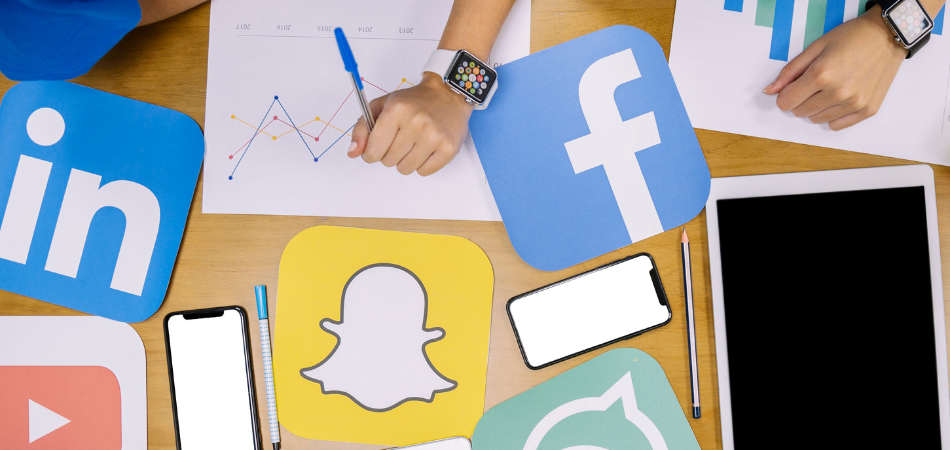Social media addiction
It’s no secret that social media has taken over the lives of many people in the UK. A recent study found that the average person spends over two hours on social media every day, and that number continues to grow. For some people, social media is a harmless way to stay connected with friends and family, but for others, it can be a dangerous addiction. With a total of 57.6 million social media users in the UK alone, this increasingly worrying issue is showing no signs of slowing down.

What is social media addiction?
Social media addiction, a type of behavioural addiction, is a real and increasingly prevalent problem. Though it is not currently recognised as a diagnosable disorder, there is no doubt that excessive social media use can lead to negative consequences in your life. So what exactly is social media addiction?
Social media addiction refers to the compulsive and problematic use of social media platforms. This might manifest as spending too much time on social media, obsessively checking for updates or becoming agitated or anxious when unable to access social media. You may neglect important aspects of your life in favour of spending time on social media – in severe cases, social media addiction can interfere with work, school and personal relationships.
If you think you might be addicted to social media, it’s important to seek help. There are many resources available to help you break your dependence on social media and regain control of your life. Don’t suffer in silence – reach out to our team today.
Signs and symptoms of social media addiction
Social media addiction is a real and growing problem. The constant need to check for new updates can lead to feelings of anxiety and loneliness, as well as interfere with other aspects of your life.
Symptoms of social media addiction include:
- Feeling anxious, depressed or irritable when not using social media
- Feeling the need to constantly check for new updates
- Neglecting other important activities in favour of social media
- Using social media as a way to escape from problems or negative emotions
- Experiencing negative consequences as a result of using social media excessively
- Spending more and more time on social media despite negative consequences
- Neglecting your appearance or hygiene
- Losing track of time while on social media
- Losing sleep as a result of social media due to staying up late to scroll
If you have noticed any of these signs and symptoms in yourself, it is possible that you have an addiction to social media. Similarly, if you have witnessed any of these signs in a loved one and suspect that they are addicted to social media, it is time to seek professional help. There are many resources available to help people who are struggling with social media addiction. With proper treatment, it can be overcome.
How does social media addiction develop?
Though it may seem harmless, spending too much time on Facebook, Twitter, Instagram, TikTok and other platforms can have serious consequences. So how does social media addiction develop? What happens in your brain when you get too caught up in likes, comments and shares?
There are a number of factors that contribute to social media addiction. First, platform designers use techniques that keep users coming back for more. For example, notifications send you alerts whenever someone likes or comments on your posts, which can trigger a hit of dopamine, the “feel-good” neurotransmitter. Individuals may use this “like” as reinforcement and may chase this dopamine hit by posting again and again.
The constant stream of information also keeps your brain engaged, making it difficult to take a break from the screen. Algorithms use information from previously viewed content to know exactly what you like to see – with every click sending more information to keep you hooked.
Over time, these factors can lead to real addiction. Studies have shown that excessive social media use alters brain chemistry in ways similar to those seen in substance abuse disorders and can even change the way we think.
As you become unable to control the urge to check your social media feeds, it makes it incredibly tough to stop without professional guidance. If you’re worried that you may be addicted to social media, it’s important to seek help before the problem gets worse.
Who is at risk of developing social media addiction?
While anyone can be at risk of developing an addiction to social media, there are certain groups who are more vulnerable than others. These include:
Teenagers and young adults
Teenagers and young adults are particularly at risk due to their constant use of social media platforms such as TikTok and Instagram. The need to establish your identity and fit in with peers at this age makes you particularly susceptible to social media addiction.
Mental health issues
Individuals who suffer from anxiety or depression are also more likely to develop an addiction to social media. This is because they often use social media as a way to cope with their feelings of anxiety or isolation. For example, social media may allow those suffering from social anxiety to feel connected to others without having to leave their home.
Genetics
If you are naturally impulsive or easily bored you are more likely to develop a social media addiction. In fact, research from Kent State University indicated that a person’s genes can directly influence the amount of social media an individual uses, and genetics were found to have an even stronger influence than environmental factors.
If you fall into one of these high-risk groups, you should take steps to avoid social media consuming every aspect of your life. It is never too early to talk to a professional – in fact, the sooner you ask for help, the easier your recovery will be.
Can social media addiction be treated?
While the concept of social media addiction is still relatively new, it is clear that spending too much time scrolling can lead to real-life problems. Like any other addiction, social media addiction can be difficult to overcome without professional help.
Inpatient rehab programmes that focus on social media addiction can be very effective, as they provide you with the structure and support you need to break your dependence on social media.
Some therapies that are commonly used to treat social media addiction include:
- Cognitive behavioural therapy (CBT): helps you to identify and change destructive patterns of thought and behaviour.
- Dialectical behaviour therapy (DBT): teaches you how to deal with intense emotions in a healthy way.
- Motivational interviewing: helps to find and keep your motivation – an essential means for long-term recovery.
- Mindfulness-based therapy: assists in assuring your emotional peace of mind and prevents relapse.
Inpatient rehab is often the most successful option for social media addiction, as it allows clients to focus on their recovery without distractions. With the help of our experienced treatment team, you can learn to live a life that is not dominated by the need to check your feed.
Social media addiction: myths and facts
It’s no secret that social media has become a staple in many people’s lives. We use it to stay connected with friends and family, to follow our favourite celebrities and to stay up-to-date on the latest news. There is, however, a growing concern that more and more people are becoming addicted to social media and with this comes many misconceptions.
Some common myths surrounding social media addiction and treatment include:
It’s not an addiction – you just need to reduce your time spent on social media
One common myth is that social media addiction is simply a case of spending too much time on social media platforms. However, it is more than just time spent scrolling your feed – it’s also about how social media use is impacting your life offline. For example, you may start neglecting responsibilities or hobbies in favour of spending time on social media or experience symptoms of withdrawal (for example, irritability, anxiety or strong urges to use social media) when you’re unable to access your accounts.
Only young females are addicted to social media
Another common myth is that only certain types of people can be addicted to social media. While it is true that young females are more active across social media platforms, in reality, anyone can develop a social media addiction regardless of age, gender or socioeconomic status.
You don’t use social media all the time, so you are not addicted
Some people believe that you can’t be addicted to social media if you’re not using it excessively, but just like with any other addiction, it’s possible to develop an unhealthy relationship with social media even if you’re using it in moderation. If you find yourself feeling anxious or depressed when you’re not on social media, or if you find yourself sacrificing important things in your life in order to spend more time on social media, then you may be suffering from social media addiction.
Social media isn’t dangerous so rehab isn’t required
There is a growing body of evidence that suggests social media can be extremely harmful to our mental and emotional well-being. Studies have shown that exposure to social media can lead to feelings of inadequacy, jealousy and low self-esteem. Research suggests that social media use is associated with increased levels of anxiety and depression, as well as disrupting our sleeping patterns and reducing satisfaction in our relationships. It is all too easy to compare your reality to the seemingly “perfect” lives of others, making you feel inferior to your peers.
Additionally, social media can exacerbate existing conditions such as eating disorders. Seeing a constant stream of edited and airbrushed pictures can act as a trigger for those who have issues surrounding food and lead them to spiral.
Next steps
Sanctuary Lodge can help you to repair and rebuild your life away from social media and give you the chance to take back control of your life. If you would like to discuss treatment options further, don’t hesitate to give us a call.






